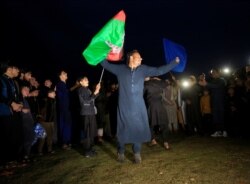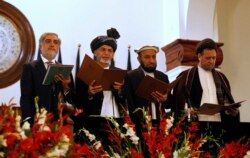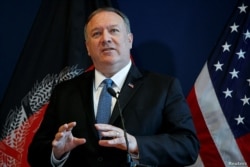Intense pressure from the international community, coupled with fatigue among ordinary Afghans toward a repeat of past election fiascos, seems to have taken the wind out of a political crisis in Kabul following the bitterly disputed results of a presidential election.
After the Afghan election commission declared incumbent President Ashraf Ghani the winner earlier this month, his chief rival, Abdullah Abdullah, declared the results invalid and himself the real victor.
This week, both sides were planning parallel inauguration ceremonies. A similar crisis after the 2014 election became so destabilizing that it required direct intervention from then-Secretary of State John Kerry, who brokered a power-sharing agreement and formed the Unity Government that led Afghanistan for the past five years.
This time is different. While the Afghan elite was busy staking its claim to power, regular Afghans were suffering from a sense of deja vu multiple times over.
“The fact that elections have been contested before [not just once but almost twice, in 2009 as well], that Afghans and observers predicted a similar standoff to 2014 would happen, has contributed to a sense of inevitability and fatigue for many,” said Andrew Watkins, a senior analyst on Afghanistan for the International Crisis Group.
Top priority: peace
Not to mention the fact that after 19 years of war, Afghans may not have patience for anyone or anything that stands between them and the prospect of peace. In street interview after street interview by VOA teams, Afghans have mentioned peace as their top priority. According to the U.N. Assistance Mission in Afghanistan, the war has taken more than 100,000 Afghan lives. Millions are internally displaced and facing hardships. Every Afghan knows someone who was killed or wounded or had to flee.
For the first time in many years, the prospect of peace seems greater than ever before, especially when the other side, the Taliban, also has sent repeated signals of its willingness to be flexible.
In an unprecedented move, the deputy leader of the Taliban, Sirajuddin Haqqani, who also leads the group’s deadliest faction, the Haqqani Network, wrote an op-ed in The New York Times titled “What We, the Taliban, Want.”
“We are aware of the concerns and questions in and outside Afghanistan about the kind of government we would have after the foreign troops withdraw. My response to such concerns is that it will depend on a consensus among Afghans. We should not let our worries get in the way of a process of genuine discussion and deliberation free for the first time from foreign domination and interference,” he wrote.
It is hard to say whether Haqqani managed to convince his skeptics. What is more certain is that a great deal of deliberation among the top-tier Taliban leaders must have gone into putting his name to their message.
Possible spoiler
“This appears to have been written with the intent of refuting a popular refrain, that the Haqqani Network — with its strong historical ties to Pakistan's intelligence service, as well as to more globally oriented jihadist groups in the region — is likely to play spoiler to any peace deal that the Americans or even intra-Afghan talks may come to with the Taliban,” Watkins said.
He added the fact that the Taliban seem to be addressing their skeptics head-on was a sign of forward progress, if not yet one of trust.
So when Ghani and Abdullah seemed poised to launch into a repeat of 2014, the international community was quick to express its displeasure.
“It is time to focus not on electoral politics but on taking steps toward a lasting peace, ending the war with the Taliban, and finding a formula for a political settlement that can serve the interests of all of this country’s citizens through intra-Afghan negotiations we expect will begin in March,” said a statement issued by State Department spokeswoman Morgan Ortagus this week.
NATO Secretary-General Jens Stoltenberg expressed a similar sentiment, asking all sides to “engage in dialogue and unite behind the peace process, which is the priority for all Afghans.”
Still, the election dispute has the potential to complicate the formation of a team of negotiators at a time when Afghan politicians should be building consensus about how to present a united front to the Taliban, said Michael Kugelman, deputy director of the Asia program at the Washington-based Wilson Center research group.
Phase two
The intra-Afghan negotiations, as they are called, are the second phase of a deal the United States has negotiated with the Taliban to end its longest war. The historic signing ceremony is to take place in Qatar’s capital, Doha, this Saturday.
As part of that deal, the Taliban have agreed to start negotiations with a team of Afghans, including representatives of the government, other political factions, human rights activists and women, to decide the future of their country.
International stakeholders, including the U.S., are expected to play only a supporting role this time.
"Our mission set is very clear. We want to assist and provide structure so that the Afghans can ultimately get an outcome that is led by Afghanis, driven by Afghanis and is a long-term solution that all the people of Afghanistan can live with," U.S. Secretary of State Mike Pompeo said Tuesday in Washington.
Yet if the U.S. had to pressure Ghani and Abdullah into putting their differences aside to form a negotiation team, it could do it, said Kabul-based political analyst Najib Azad.
Some, like Watkins, say the upcoming negotiations could provide Afghan political leaders with “an alternative venue for resolving their election-related grievances.”
Whether that has an impact on how well Afghans can defend their hard-won human rights gains against a more unified Taliban team is yet to be seen.











